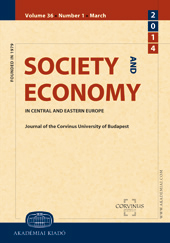Why are civil liberties more important than executive constraints in economic development? A property rights approach
Why are civil liberties more important than executive constraints in economic development? A property rights approach
Author(s): Pál CzeglédiSubject(s): Civil Law, Civil Society, Economic development, Sociology of Politics
Published by: Akadémiai Kiadó
Keywords: civil liberties; property rights; development;
Summary/Abstract: This paper develops a simple model that helps understand an important fact concerning cross-country pattern of growth and institutions shown by BenYishay and Betancourt (2010). They show that civil freedoms, especially one of their components called Autonomy and Individual Rights, are more important determinants of economic development than constraints on executives, a widely used measure in the literature on institutions and growth. The paper provides an interpretation of this fact through the lense of an argument that puts emphasis on three insights. The first is that civil freedoms can be seen as property rights broadly understood. The second is that with a higher scope of property rights enforced, the government must be able to commit to a lower level of expropriation of income. Third, institutions of freedom are sticky: they must be in line with the culture of the country so that they can be enforced with a reasonable cost. By addressing this specific question of constraints on executives versus civil freedoms the paper joins the literature which emphasizes the importance of culture in economic development.
Journal: Society and Economy. In Central and Eastern Europe ǀ Journal of the Corvinus University of Budapest
- Issue Year: 36/2014
- Issue No: 1
- Page Range: 37-68
- Page Count: 32
- Language: English

